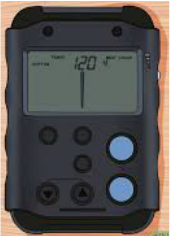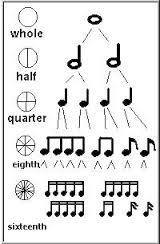Today's post will discuss some ideas on how and why to set goals. Goals can be simple or complicated, and long or short-term. It's important to consider the type of goal you are setting when you choose goals for yourself.
I'm going to break this down into a suggestion for several types of goals that people typically make. It is up to you which categories you choose! You do not have to choose them all. Start with #4 and work your way backward. If you are playing at an advanced level, be sure to choose all of them.
- Long Term Goals. These are your hopes and dreams. Your "reach" goals. What they may be depends upon where you are in your studies, but in general these are goals for the far future: goals for one, five, 10, or 20 years from now. Think big. If you are just starting out, go with a one or two year goal. If you are already pretty invested in your studies, think bigger and go for 5 years. If you're in college or have graduated, peek into the future and imagine where you'd like to find yourself 10 to 20 years from now.
- Mid-Range Goals. These are your "achievable goals." These are not just dreams; you can feel that these goals can really be a reality if you work toward them. Some examples might be: learn all the notes on the flute (beginners), learn all your scales, make first chair in band or youth symphony (middle and high schoolers), get into music school (dedicated high-schoolers) and whatever goal works for the college player (competitions, placements, repertoire and technique advancement, juries goals, grad school auditions, etc).
- Short-Term (Weekly or Monthly) Goals. These are your "deadline" goals, or your "current project" goals. Goals like this are usually related to your upcoming lessons, learning a new skill, recital preparation, or audition preparation. They can also be related to how often you will practice in a week (including a plan on how to achieve that).
- Every Day Goals. These are things you need to do every day to succeed. You should probably have a short to medium list of these. These should be the most realistic and easiest goals to tick off your list. They should be super-achievable. For procrastinators, the goals might be centered around the improvement of your practice habits. The goal list can be as simple as: remember to bring your flute home, or practice before going out today. For regular practicers, these goals will relate to fixing problem spots, giving attention to areas we've been neglecting, being sure to work out passages until we truly know them, reaching a certain metronome marking, or just remembering to work on something that really needs work. These types of goals change at each practice depending upon what you need. These are the most important goals of all, because without them, we cannot get to our longer-term goals.
Some more goal-setting tips:
- Very important: not everyone needs to set ALL of these categories of goals (at least not at first). If you are new to goal-setting, it's more important than anything else to start slow and set yourself up for success. As I mentioned above, our every day and short-term goals are the building blocks to all future success, so it's perfect to start there, and depending upon your level of drive, it's OK to not have any goals other than that. No reason to overwhelm yourself. The most important thing to do is to pick a goal.
- Make lists under each goal ("the plan!"). For each set of goals we create, it's important to also consider (or better yet, list) what needs to happen in order for them to come true. "Make All State Band" is a great goal. Just remember to ask yourself what you need to do or learn to get there. Everyone's list will be different! List whatever it is that you know you need to get there. If your goal for today's practice is: "learn the G Major scale," then you need to create a list of what needs to be done in order for that to happen. Plan how you will achieve this.
- Consider your personality: If you are really new to this idea, and you are constantly feeling like you need to be more organized or more driven, then it's important to take small bites. No one enjoys the feeling of failure that results in not doing what we set out to do, so pick something that is very achievable, like "practice one extra day this week," or "repeat tricky passages slowly today" or "check my hand position before starting each piece." If you have been at this for a while, or you are a very driven person, then your goals might be a bit more intense. You have the power to decide. The important thing is to pick something!
- Be realistic. Choose goals you know you can check off. Think about whether these goals will actually work for you. It's a disappointing feeling to make a to-do list that is too long, and to discover that we couldn't nearly complete it all. It can make us feel bad about ourselves. We might need to make our lists a bit shorter, and whittle them down to the very most important one to three items we might want to achieve for that practice or week.
- Don't worry if you are "not very good at this." You just haven't set yourself up for success in the past! It's the ability to check things off that gives us a feeling of accomplishment. Short-term goals need to be "check-off-able!" The feeling of accomplishment we get when we've checked off everything on our list feels so good that it encourages us to keep doing it. This encouraging feeling turns into what I call "drive." You don't have to be naturally driven; you can teach yourself to be this way by being careful to choose goals that will actually work.
- Once you create your goals (and your plan), be careful not to skip too far ahead. If you get so excited about what you want to do several years from now that you skip straight to it, you might be neglecting important skills that you will need to be successful. A great teacher can help keep you on track and to be sure your basics are well-covered before jumping too far ahead. You'll get there!
Remember: one of the reasons many of us (me included) avoid making lists is because we make lists that we can't possibly achieve because there are too many things on them. Choose smaller lists. Start with just one thing! Just start. Because once you do it, and check it off, you have achieved something. And then you can move on to the next thing. Each item you check off moves you a step further toward one of your goals. It's a good feeling.
Good luck! Please contact me with any questions or comments!


 RSS Feed
RSS Feed